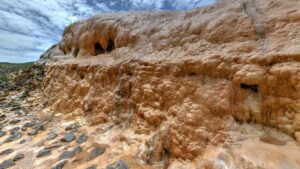In Georgia, the concept of mineral rights is not only a topic of economic interest but also a crucial element in the state’s real estate and natural resource management sectors. Whether you’re a landowner, investor, or simply curious about the potential beneath the Georgian soil, understanding mineral rights is key to unlocking opportunities and navigating the legal landscape effectively.
This article aims to shed light on the intricacies of mineral rights in Georgia, offering insights into how they operate, their significance, and practical steps for managing and capitalizing on these valuable assets.
How do Mineral Rights Work in Georgia?
In Georgia, mineral rights grant the holder the authority to explore, extract, and utilize subsurface natural resources. Unlike many misconceptions, owning land does not automatically entitle you to the minerals beneath it. These rights can be sold, leased, or retained separately from the land, creating a distinct separation between surface rights and mineral rights. This legal framework is pivotal for anyone involved in real estate, mining, or natural resource management within the state.
Georgia adheres to the principle that mineral rights can be standalone interests, detached from the surface estate. This means an individual or entity can own the rights to the minerals under your property without owning the land itself. It’s a concept that intertwines closely with property law and requires a nuanced understanding of legal and real estate principles in Georgia.
Surface Rights vs. Mineral Rights in Georgia
The distinction between surface rights and mineral rights in Georgia is significant. Surface rights refer to the control over the land surface, encompassing the right to build, cultivate, or conduct other activities.
In contrast, mineral rights focus exclusively on the subsurface resources. This bifurcation can lead to situations where the landowner has no claim over the wealth lying beneath their property unless they also own the mineral rights.
The complexities of this separation become evident in land transactions, where the transfer of mineral rights may not always accompany the sale of the land. For clarity and legal assurance, it’s crucial for property transactions in Georgia to explicitly state the status of mineral rights, ensuring both buyers and sellers understand what is being exchanged.
What are Major Oil and Gas Fields in Georgia?
While Georgia is not as renowned for its oil and gas fields as other states, there are regions with potential for exploration and development. Detailed information on specific fields within Georgia is not widely available due to the state’s modest oil and gas production. However, the pursuit of natural resources, including oil and gas, continues to be an area of interest for energy companies and landowners alike.
Interest in Georgia’s potential for oil and gas exploration is part of a broader national energy strategy. Encouraging sustainable and economically viable energy sources remains a priority, with Georgia contributing to the diverse energy landscape of the United States.
What are the Main Minerals Found in Georgia?
Georgia’s geological diversity makes it a repository of various minerals, contributing significantly to the state’s economy and industrial capabilities.
- Kaolin: Georgia is famously known for its vast deposits of kaolin, particularly in the central to eastern regions. This white clay mineral is extensively used in the production of paper, ceramics, cosmetics, and other products, making it a cornerstone of Georgia’s mining sector.
- Granite: The state is also renowned for its high-quality granite, primarily found in Elberton, which is dubbed the “Granite Capital of the World.” This durable and aesthetically pleasing stone is widely used in construction and memorial sculptures.
- Marble: Similar to granite, Georgia marble is prized for its quality and beauty. The town of Marble Hill, near Tate, is the center of marble mining in Georgia, contributing to the architecture and construction industries.
- Bauxite: Although less known, Georgia has reserves of bauxite, primarily used in the production of aluminum. The historical significance of bauxite mining in Georgia dates back to the 20th century, though it’s less prominent today.
How do I find out who owns mineral rights in Georgia?
The journey to uncover this information involves several steps, each designed to provide clarity and legal assurance in navigating the complex landscape of mineral rights within the state.
- Visit the County Clerk’s Office: Start with the county where the property is located. The county clerk holds real estate records, including deeds and leases, which can indicate who owns the mineral rights.
- Examine Property Deeds: Property deeds often outline the separation of surface and mineral rights. Reviewing these documents can reveal whether mineral rights were retained by a previous owner or conveyed with the property.
- Consult Tax Records: Tax records may list mineral rights separately from surface rights, offering insights into ownership and potential tax liabilities associated with the mineral rights.
- Engage with a Title Company or Landman: Professionals like title agents or landmen specialize in researching property titles and can provide detailed reports on mineral rights ownership.
- Seek Legal Advice: An attorney experienced in real estate or mineral rights law in Georgia can help interpret legal documents and advise on ownership and potential issues.
How to search for mineral rights records in Georgia?
To efficiently navigate the search for mineral rights records, follow these structured steps:
- Online Databases: Start with online resources. Some counties in Georgia have digitized their records, making preliminary research possible from home.
- Physical Records Search: For more thorough research, visit the county recorder’s office. Older records or those not digitized will require a manual search.
- Use GIS and Mapping Tools: Geographic Information System (GIS) tools offered by some counties can help identify property boundaries and may provide clues to mineral rights ownership.
- Land Survey Records: Checking land survey records can sometimes offer information on mineral rights, especially in areas with known mineral deposits.
How do you claim mineral rights in Georgia?
Claiming mineral rights in Georgia, whether you’ve discovered untapped resources on your property or are rectifying a previous oversight, involves a clear process. This initiative can significantly impact the property’s value and legal status.
- Confirm Ownership: Ensure you legally own the rights by reviewing your property deed and obtaining a title opinion from a qualified attorney.
- File a Claim with the County: If your research confirms your ownership but it’s not officially recorded, file a mineral rights claim with the county recorder’s office where the property is located.
- Legal Documentation: Prepare and submit the necessary legal documents, such as a mineral deed, which clearly states your claim to the mineral rights.
- Notice of Claim: Some jurisdictions require you to notify adjacent property owners or publish a notice in local newspapers, providing a chance for any challenges to your claim.
- Consult with Professionals: Engaging with an attorney or a land management specialist can provide guidance through the process, ensuring compliance with Georgia’s laws and regulations.
How does mineral rights inheritance work in Georgia?
In Georgia, the process of inheriting mineral rights follows a pathway similar to the inheritance of other types of property, yet it encompasses specific considerations given the distinct nature of these rights.
Understanding the nuances of this process is crucial for anyone standing to inherit or planning to bequeath such assets.
When an individual owning mineral rights passes away, these rights transfer to their heirs or as dictated by the deceased’s will.
The absence of a will means that the state’s laws of intestacy come into play, dividing the estate, including mineral rights, among the legal heirs. The transfer of mineral rights through inheritance necessitates a thorough examination of the deceased’s estate documents, including deeds and wills, to determine the rightful beneficiaries.
Key steps for the inheritance process include:
- Obtaining a copy of the death certificate.
- Locating the will or other estate planning documents.
- Filing necessary legal documents with the probate court.
- Preparing a new deed for the mineral rights, if required, to reflect the change in ownership.
Do you have to pay taxes on mineral rights in Georgia?
Yes, in Georgia, owners of mineral rights are subject to specific tax obligations, reflective of the value and productivity of their assets.
Taxes on mineral rights can manifest in various forms, including property taxes on the value of the mineral rights themselves and income taxes on any revenue generated from those rights, such as from leases or the extraction and sale of minerals.
Practical examples of tax implications include:
- Property Taxes: The value of mineral rights is considered when assessing the overall value of a piece of property for property taxes. Counties in Georgia evaluate these rights as part of the land value, and taxes are levied accordingly.
- Income Taxes: Revenue generated from mineral rights, whether through leasing agreements for exploration and extraction or through the direct sale of extracted minerals, is subject to state and federal income taxes. The specifics of these tax liabilities depend on the nature of the income and the applicable tax rates.
How Much Are Mineral Rights Worth in Georgia?
Determining the value of mineral rights in Georgia is a nuanced process, influenced by a variety of factors including the type of mineral, market demand, location of the land, and whether the minerals are currently being produced or have potential for future production.
While providing an exact average price is challenging due to these variables, we can explore the general factors that influence value and how these might apply within Georgia.
How Much Are Mineral Rights Worth Per Acre in Georgia?
The worth of mineral rights per acre in Georgia can vary widely. Factors such as the presence of valuable minerals like kaolin, which is prevalent in the state, and the potential for oil and gas in certain regions, affect the price. Generally, the value can range from a few hundred to several thousand dollars per acre.
Leasing Mineral Rights Value
Leasing mineral rights, where a property owner grants exploration and extraction rights to a company for a specified period, can also influence the value of mineral rights. Lease payments may include an upfront bonus, along with royalty payments based on the production of minerals. In Georgia, lease terms and royalty rates can significantly impact the overall value derived from mineral rights, with competitive leasing terms improving the value of these rights to the owner.
Non-Producing Mineral Rights Value
Non-producing mineral rights, where no active extraction is occurring, hold potential value based on speculation about the presence of valuable minerals and the likelihood of future development. In Georgia, these rights might be valued lower than producing rights but can still represent a significant opportunity, especially if upcoming exploration activities or technological advancements make extraction viable.
Producing Mineral Rights Value
Producing mineral rights, where active extraction is happening, are typically more valuable. The income generated from the sale of extracted minerals provides a clear basis for valuation. In Georgia, the value of producing mineral rights will depend on the volume and type of minerals being produced, the market conditions, and the efficiency of extraction operations.
How Do You Buy Mineral Rights in Georgia?
Buying mineral rights in Georgia is a structured process that requires due diligence and a clear understanding of property and mineral law within the state.
Here’s a list to help you navigate the acquisition of mineral rights in Georgia, ensuring you make informed decisions every step of the way.
- Conduct Preliminary Research: Start by identifying the areas in Georgia where you are interested in acquiring mineral rights. Utilize online resources, geological surveys, and state mining records to understand the potential mineral deposits in these areas.
- Seek Legal Advice: Consult with an attorney who specializes in mineral rights and real estate law in Georgia. This step is crucial for understanding the legal framework, potential pitfalls, and ensuring your interests are protected.
- Locate Potential Properties: Use county records, real estate listings, and mineral rights exchanges to find properties with available mineral rights. Pay attention to listings that explicitly mention the inclusion of mineral rights with the sale.
- Evaluate the Value: Assess the value of the mineral rights you’re considering purchasing. This may involve geological assessments, reviewing production history, and forecasting future potential. Hiring a professional geologist or a mining engineer could be beneficial.
- Negotiate Terms: Once you’ve identified a potential purchase, negotiate the terms of the sale. This includes the price, transfer of rights, and any specific conditions related to the mineral rights. Your attorney can assist in drafting or reviewing the contract to ensure it meets your needs and complies with Georgia law.
- Complete Due Diligence: Before finalizing the purchase, conduct a thorough due diligence process. This includes verifying the seller’s ownership of the mineral rights, checking for any liens or disputes, and ensuring there are no environmental liabilities associated with the property.
- Close the Transaction: With all the necessary information and agreements in place, close the transaction. This typically involves signing a deed or agreement that transfers the mineral rights from the seller to you, which then must be recorded with the county clerk’s office where the property is located.
How To Sell Your Mineral Rights in Georgia?
Selling mineral rights you own in Georgia involves a series of steps designed to ensure you receive a fair price and that the transfer is legally sound.
Here’s how to approach the sale of your mineral rights.
- Assess the Value: Begin by determining the value of your mineral rights. Consider hiring a professional appraiser with experience in minerals to get an accurate estimate. Factors such as current production, future potential, and market demand will influence the valuation.
- Market Your Mineral Rights: You can choose to market your mineral rights through a broker specialized in mineral transactions, list them on a mineral rights marketplace, or directly approach companies that might be interested in acquiring such rights in Georgia.
- Vet Potential Buyers: As offers come in, vet potential buyers for financial stability and experience with mineral rights transactions. It’s essential to ensure that the buyer has the means and intention to follow through with the purchase.
- Negotiate the Sale: Work with your attorney to negotiate the terms of the sale. This includes not just the price, but also any conditions or contingencies related to the transaction. Ensure the agreement is in your best interest and complies with Georgia laws.
- Conduct Due Diligence: The buyer will likely conduct due diligence, verifying the ownership and status of the mineral rights. Be prepared to provide documentation and access to records that can assist in this process.
- Finalize the Sale: Once both parties agree to the terms, finalize the sale with a legal document that transfers ownership of the mineral rights. This document must be recorded with the county to officially document the change in ownership.
How Do I Transfer Mineral Rights in Georgia?
Transferring mineral rights in Georgia is a detailed process that involves several steps to ensure legality and accuracy. Here’s how to approach this significant transaction:
- Review the Original Deed: Begin by reviewing the original deed to understand the specific terms and conditions associated with the mineral rights.
- Consult with a Real Estate Attorney: Engage a Georgia-based attorney who specializes in real estate or mineral law to guide you through the legal intricacies of transferring mineral rights.
- Prepare a New Deed: The attorney will help prepare a new deed that specifically transfers the mineral rights from the current owner to the new owner. This document should detail the rights being transferred, including any limitations or conditions.
- Sign in the Presence of a Notary: Both parties should sign the deed in the presence of a notary to ensure that the signatures are legally validated.
- File the Deed with the County Clerk: Submit the signed and notarized deed to the county clerk’s office where the property is located. This step officially records the transfer and updates public records.
- Notify Relevant Parties: Inform any tenants, lessees, or companies operating under lease agreements on the property about the change in ownership of the mineral rights.
- Update Estate Plans: If applicable, update your estate plan to reflect the transfer of mineral rights, ensuring that all aspects of your assets are accurately documented.
Conclusion
Understanding and managing mineral rights in Georgia involves a detailed legal process, whether you’re transferring, buying, or selling these rights. By following the correct procedures and consulting with professionals knowledgeable in Georgia’s real estate and mineral laws, you can navigate these transactions smoothly and ensure your interests are protected.
Always remember the value of detailed records and proactive management in maintaining the integrity and value of your mineral rights.









Leave a Reply